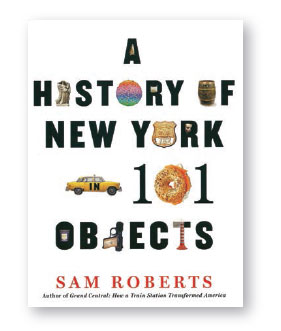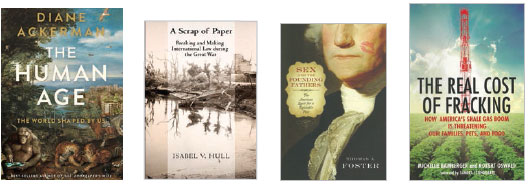 A History of New York in 101 Objects by Sam Roberts ’68 (Simon & Schuster)
A History of New York in 101 Objects by Sam Roberts ’68 (Simon & Schuster)
by Sam Roberts ’68 (Simon & Schuster)
earching for paradigmatic but quirky artifacts that define the past is an irresistible parlor game,” writes the urban affairs correspondent for the New York Times. The objects he chooses—from an artichoke to an elevator safety brake, a public high school yearbook to a cheap handgun, a skeletal model of King Kong to a mechanical cotton picker—played some transformative role in New York City’s history. “They range from distinctive curios you didn’t know existed to prosaic artifacts that we take for granted but are unmasked in a different light.”
The Human Age by Diane Ackerman, MFA ’73, PhD ’79 (Norton). “We have become such powerful agents of planetary change that we need to rename the geological age in which we live,” argues the author of A Natural History of the Senses. “At every level, from wild animals to the microbes that homestead our flesh, from our evolving homes and cities to virtual zoos and webcams, humanity’s unique bond with nature has taken a new direction. Without meaning to, we’ve created some planetary chaos that threatens our well-being.” Despite the problems facing the planet, Ackerman places hope in our talent for innovation.
A Scrap of Paper by Isabel V. Hull (Cornell). Taking as her title the remark by the German chancellor that the treaty guaranteeing Belgian neutrality was merely a “scrap of paper,” the John Stambaugh Professor of history at Cornell examines the role of international law in the origins and conduct of World War I. “How different (or similar) was Imperial Germany from the Western Allies in its interpretation of international law?” she asks. “Military necessity and the laws of war are on opposite ends of a seesaw—the more power you grant to military necessity, the less the law applies or is obligatory.”
Sex and the Founding Fathers by Thomas A. Foster ’91 (Temple). The press subjects politicians and other public figures to extreme scrutiny, but earlier eras did much the same, argues an associate professor of history at DePaul University. “We tend to think of our interest in reconciling public images with private sexual conduct as uniquely postmodern,” Foster writes. “In fact, Americans have long invested national heroes with superior moral status and at the same time probed into their private lives.” He shows how each generation reshapes images of the Founders to fit its own time.
The Real Cost of Fracking by Michelle Bamberger, DVM ’85, and Robert Oswald (Beacon). A veterinarian and a professor of molecular medicine at Cornell interviewed small farmers in rural Pennsylvania about the effects of living near gas-drilling sites. Their research exposes serious environmental and health problems that hydraulic fracturing poses for water, air, animals, people, and the food supply. “Do the costs outweigh the benefits?” they ask. “We require energy to live in the modern world, but what degree of risk is acceptable to obtain that energy? Who should be asked to sacrifice, and who should profit?”
Fiction
Notes from the Internet Apocalypse by Wayne Gladstone ’95 (Thomas Dunne). When the Internet crashes, society is turned upside down in this satirical debut novel. Millions must shed their anonymity and communicate face to face, addicts of cat videos hunt for felines to make them perform, and Twitter fanatics speak to themselves in 140 characters.
The Barter by Siobhan Adcock ’95, MFA ’04 (Dutton). A psychological thriller set in 1902 and the present follows the lives of two mothers from different backgrounds who endure unhappy marriages and make haunting sacrifices.
The Swap by Megan Shull ’91, PhD ’98 (HarperCollins). When Ellie and Jack magically switch bodies, they discover that walking in each other’s shoes isn’t as easy as they had assumed. In this young adult novel, the author of Amazing Grace follows the pair as they suffer the dramas and pratfalls of life in middle school.
The Boy in the Woods by Carter Wilson ’92 (Severn House). Thirty years after three friends witness a murder and are forced to dig a grave, one of them bases a novel on the crime. When a woman asks for the author’s autograph, she leaves a note that reads, “You didn’t even change my name,” and threatens to reveal his secret.
Non-Fiction
National Responses to the Holocaust edited by Jennifer Taylor, PhD ’95 (Delaware). An associate professor of German studies at the College of William and Mary edits a collection of essays on the complex relationship between the traumatic past and the sense of place, language, culture, and political identity in nations affected by the Holocaust.
The Piero Affair by Pat Musick, PhD ’74 (camusart.com). In a memoir that covers forty-five years of visits and adventures in Italy, an artist and author tells of her love for Tuscany and the work of early Renaissance painter Piero della Francesca.
The American Way of Bombing edited by Matthew Evangelista, PhD ’86, and Henry Shue (Cornell). A discussion of the changes in ethical and legal norms governing air warfare over time.
Beyond IQ by Garth Sundem ’98 (Three Rivers). The author of The Geek’s Guide to World Domination argues that IQ is only one part of intelligence and provides hands-on exercises for boosting insight, willpower, creativity, and problem solving.
Traders and Raiders by Natale A. Zappia ’96 (North Carolina). When Spanish colonists entered the Colorado River basin in the sixteenth century, they encountered indigenous peoples who had already formed economic, political, and social links. An assistant professor of history at Whittier College examines the cultural geography of Southern California, Nevada, New Mexico, Utah, Arizona, Sonora, and Baja California.
Rustics and Politics by Leslie Dale Feldman ’80, PhD ’90 (Lexington). “The Beverly Hillbillies is replete with political ideas,” argues a professor of political science at Hofstra University, “and has come to occupy a special place in popular culture as a classic television icon because of its relationship to how we think about wealth, status, social mobility, and the American dream.”
Supercommunicator by Frank J. Pietrucha ’85 (AMACOM). The president of Definitive Communications offers advice on using digital tools to explain complex ideas. “Winners in the transition from print thinking to digital expression,” he contends, “will be people who can transfer classic communication styles to a uniquely modern paradigm.”
Zayd by David S. Powers (Penn). In a scholarly biography of Muhammad’s adopted son, a professor of Near Eastern studies at Cornell argues that Zayd’s character in Islamic narratives is modeled on biblical figures such as Isaac, Ishmael, and Joseph.
Flex by Jane Hyun ’90 and Audrey S. Lee (HarperBusiness). Two executive coaches give managers advice on how to switch among leadership styles to get the most out of employees and be more competitive in today’s global economy.
Real Objects in Unreal Situations by Susan Felleman ’81 (Chicago). Focusing on such films as The Trouble with Harry, An Unmarried Woman, and Pride & Prejudice, a professor of art history and film and media studies at the University of South Carolina analyzes the relationship between film and other visual arts.
Fruitful by Brian Nicholson ’94 and Sarah Huck (Running Press). Showcasing the variety of seasonal fruits, Nicholson, the president of Red Jacket Orchards, and Huck, the author of Campfire Cookery, describe recipes for juices, pies, cobblers, and dishes that range from strawberry-black pepper granita to rustic apricot and raspberry crostada to scallop and blue-berry ceviche.


